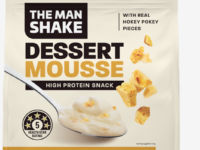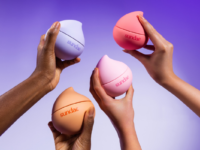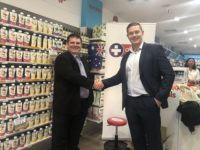 Dwayne Martens, the founder of health food giant Amazonia, knew he wanted to go into business at a young age, but his passion was not always health.
Dwayne Martens, the founder of health food giant Amazonia, knew he wanted to go into business at a young age, but his passion was not always health.
Aged 23 years and following an overseas trip, studying many mindset books and a failed foray into frozen fruit, he just wanted to get into business.
“At the start I bought a bunch of fancy frozen fruits from a friend of a friend, which I tried to sell at the markets and into cafes … to no avail. I kind of wasted my money you could say.”
But one product stood out – acai. Everyone was talking about its great benefits, including Oprah Winfrey and Dr Perricone.
“One of the great things about a small business is you can adapt, and you can adapt quickly,” Martens tells Inside FMCG. “I saw that acai was doing well, so I forgot about the rest and just focussed on taking acai in a freeze-dried form to as many health-food stores as possible.
“We went from nothing to turning over $2 million a year in literally six months.”
Despite the overnight success, it was not all sunshine and roses for the entrepreneur. The fruit had become so popular the market was saturated. While he knew the quality and integrity of his product, Martens found that nobody wanted it.
“When the hype settled after a year, everything went kaput for us. No-one wanted our products any more because the brand wasn’t built authentically,” he says.
Add a foreclosure and a flood that destroyed a warehouse full of product, and the saying “bad things come in threes” really came to life for Martens.
Six years later, with a team of 30, his Amazonia empire turns over more than $1 million a month. It offers a range of vitamins, proteins and prebiotics in independent supermarkets, health-food stores and cafes all over the world.
Martens speaks to Inside FMCG about his growing multimillion-dollar, multinational health empire, and what it is like to run a truly sustainable business.
Inside FMCG: Amazonia is experiencing high growth – what’s on the go for you and the team now?
What’s not on the go at the moment?! With growth comes a lot of growing pains, you could say. We’re in the midst of launching a large number of new products – all very strong innovations in the marketplace.
We are about to launch frozen pitaya (dragonfruit), for which there’s been a large demand. We also have many new products in our supplement range, which has been a very successful range for us. Then we have the raw range.
It is also coming into our peak time of the year, so a lot of marketing campaigns are coming into effect – promotions and everything like that. We are pushing quite heavily in that area.
We understand that more and more people are going to come into this space. It’s inevitable. So we are very, very strenuous on making sure we are the most authentic brand in the space – certified organic, certification labels, going over and above. It’s not the best approach for the bottom line, but that’s not our game. Our game is to provide really good, healthy food for a lot of people. Yes, bottom line needs to be taken care of, but it’s also about providing the next level of health.
Inside FMCG: You have recently returned from visiting Vietnam and Bali. What was the reason behind the trip?
In Vietnam, I was overseeing the supplies of coconut and of pitaya. A number of our products come from there.
We did a video while I was there showing the adventures of going back to the source and what organic agriculture is doing. We also want to tell the story about the change we are making. We have a very strong purpose behind this brand: not only do we provide good nutrition to a lot of people, but that actually has an effect on the environment, especially with organic growing standards.
We supply a few products to Bali, like acai.
Inside FMCG: You are dedicated to being sustainable, preserving forests and farmland as well as paying families abroad wages that far surpass fair-trade standards. Why is this so important to Amazonia?
We are trying to change industries. For example, with the acai we help preserve thousands of acres of natural acai forests.
Our sustainability standpoint is very strong. We believe consumers have a choice – they can choose to buy the acai that is sustainably harvested and gives a solid income to those communities that keep trees standing.
We are a mission-based brand, and we want to lead that social-responsibility space.
Consumers want their purchasing power to make an impact. I believe that’s going to become more and more important as time goes on. That is where we’re situating ourselves and making ourselves an authentic brand.
Inside FMCG: You have built your business on providing health-conscious consumers with nutritious food and supplements. Is this your point of difference?
There’s absolutely no doubt in the matter. People are looking for healthier alternatives because products on the market right now are health hazards.
There is huge malnourishment in our society, coupled with increased toxins or additives in our food system. The fact of the matter is, if you don’t care what you put into your mouth these days, you are unhealthy. It’s as simple as that, because it is incredibly easy to get your hands on bad food.
Inside FMCG: We’ve seen a huge rise in the health-focussed consumer, but at the same time it seems that we are becoming more and more unhealthy as a population…
I agree. We’re growing more and more unhealthy as a population because the food industry is based on profits. Unfortunately, the cheapest ingredients are generally not good for health.
Good foods are becoming more and more scarce. By 2020, I think two-thirds of people will be obese.
Inside FMCG: Your products are available all over the place, from pharmacies to the Harris Farm store. What about the big guys like Coles and Woolworths?
We have certain ranges that are very strong in a niche environment, and we have certain ranges that can move into that space.
We don’t want to go there with our niche product, because if we go there with our niche brand, it just doesn’t work. We are quite heavily set in health, but some of our new product developments will focus on that broader retailer space as well.
Inside FMCG: So what’s the next big thing for Amazonia?
The next big thing for Amazonia is what we have been progressing with over the past two to three years. We have a couple of supplement ranges focussed on functional nutrition, which I believe is the next big thing in the supplement world. People actually want to have real nutrients.
There is going to be a lot more awareness of the synthetic supplementation that is rife through the whole system. There is going to be more awareness of real functional nutrition – the nutrients, vitamins and minerals your body actually knows how to use.
We already see natural supplementation really moving to the forefront, and this is exciting for us because we really focussed our attention on this. We’ve been in that space for quite some time.
We’re leading the way in a number of spaces, and when you do that you need to put a lot of time and effort.
On my side of things, I focus on marketing and international. We’re in the EU. We’re in South Korea. We’re New Zealand. We’re not a small company any more. It’s a world market, as I see it.
The great thing is that big brands use Australia as a test market, because it is one of the hardest retail environments in the world. That works as an advantage. If you can do well in this country, you can certainly do well in other countries.
Don’t get me wrong, everyone’s unique, but that’s how we see it. We’re testing the market, we’re testing the world marketplace, and we’re putting every strategy in place for international growth.
This article was featured in the October edition of Inside FMCG. Subscribe here.














